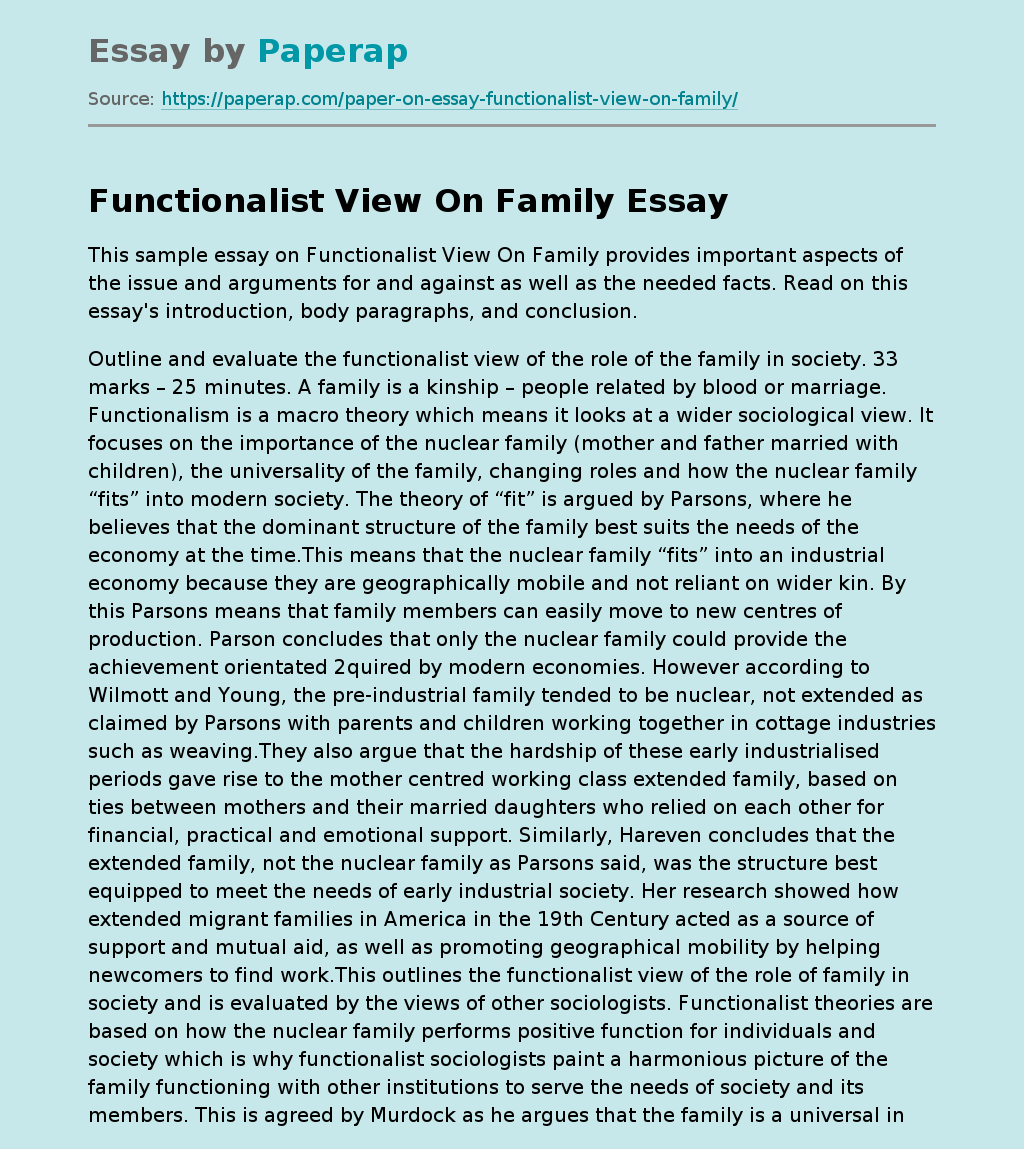Ever wondered why families exist? What purpose do they serve in our society? While the answer may seem obvious on the surface – love, companionship, and support – sociologists delve deeper, exploring the intricate mechanisms that families provide to maintain social order. This is where the functionalist perspective comes in, offering a unique lens through which we can understand the fundamental role of families in society.

Image: www.tes.com
The functionalist view, a prominent sociological theory, emphasizes the interconnectedness of society’s parts and how they work together to create stability and harmony. Applied to the family, it examines the vital functions families fulfill, contributing to the overall well-being of individuals and society as a whole. This article will explore the core principles of the functionalist view on the family, its historical context, key functions, and limitations, providing an insightful journey into the dynamics of family life.
Origins and Key Players
Early Pioneers:
The roots of functionalism can be traced back to the 19th century, with pioneers like Émile Durkheim, a French sociologist who explored how social structures maintain order and cohesion. This foundational work paved the way for later functionalist theorists like Talcott Parsons, who explicitly addressed the family’s role in the modern industrial society.
Talcott Parsons and the Nuclear Family:
Parsons, a prominent figure in the mid-20th century, played a pivotal role in shaping our understanding of the functionalist approach to the family. His theories focused on the nuclear family, a unit composed of two parents and their children, and its contributions to social stability. He argued that the family, as a primary social institution, serves essential functions by:
- Socialization: The family instills in its members the values, beliefs, and norms of society, creating a foundation for social order. Children learn basic skills like language, manners, and social expectations within the family structure.
- Economic Function: Traditionally, the family provided for its own needs through labor and resource management. While economic roles have changed over time, the family still plays a significant role in managing finances and providing for its members.
- Emotional Support and Stability: Families provide a secure and loving environment, offering emotional support, companionship, and a sense of belonging, crucial for individual well-being and stability.
- Reproduction: From a functionalist perspective, families ensure the continuation of society by producing and raising new members. This function underlines the family’s role in maintaining a stable population.

Image: paperap.com
Diverse Family Structures and Functionalist Perspectives
While Parsons’ theories centered on the nuclear family, the functionalist view has evolved to encompass the diverse forms families take in modern society. Functionalist perspectives have evolved to acknowledge the various family structures that contribute to the functioning of society:
Extended Families:
Many cultures embrace extended families, where multiple generations live together, offering shared resources, childcare, and emotional support. These structures can provide a strong sense of community and contribute to the well-being of individual members.
Single-Parent Families:
Single-parent households have increased in recent decades. Functionalists recognize that these families, while facing unique challenges, often fulfill many of the same functions as two-parent households. They provide socialization, emotional support, and a stable environment for their children.
Same-Sex Families:
The growing acceptance of same-sex relationships and families has led to a broader understanding of family structures. Functionalists acknowledge that same-sex families contribute to social stability by providing loving environments, emotional support, and socialization for their children, similar to other family models.
Criticisms of the Functionalist View
Despite its insights, the functionalist perspective on the family has faced criticism for its limitations:
Ignoring Diversity and Inequality:
Critics argue that functionalism oversimplifies family structures, neglecting the diversity of family forms and experiences present in society. It often focuses on the presumed ideal, the nuclear family, neglecting the complexities and inequalities that exist within different families.
Ignoring Conflict and Power Dynamics:
Functionalism tends to downplay conflict and power imbalances within families. It often overlooks issues such as domestic violence, gender inequality, and unequal distribution of household labor, which can have significant impacts on family well-being.
Change and Adaptation:
Functionalism struggles to fully explain how families adapt and change in response to social shifts. Rapid changes in technology, economic structures, and cultural values often outpace traditional functionalist frameworks, underscoring the need for a more dynamic and flexible approach to understanding families.
Modern Interpretations and Future Directions
Contemporary Functionalism:
Modern functionalist perspectives continue to evolve, incorporating greater diversity, and recognizing the changing roles of families in society. Current research explores how families adapt to globalization, economic uncertainty, and technological advancements. This approach considers the ways families continue to provide essential support, socialization, and a sense of belonging in a changing world.
Importance of Flexibility:
As society continues to transform, understanding the functions of families requires flexibility. We need to move beyond rigid definitions and embrace a more nuanced view that recognizes the diverse ways families contribute to individual and societal well-being.
Functionalist View On The Family
Conclusion
The functionalist view offers a valuable framework for understanding the fundamental role of the family in maintaining social order. By highlighting the essential functions families provide, such as socialization, emotional support, and economic contribution, this perspective reveals the interconnectedness of families to society. However, it’s crucial to acknowledge the limitations of this view, particularly its tendency to overlook diversity, power imbalances, and the ever-changing dynamics of families in the modern world. As we embark on a journey to better understand families, embracing a more nuanced and inclusive approach will be essential in navigating the complexities of family life in a dynamic society.





